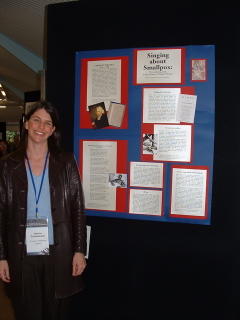I've been thinking about 'fierce religion' after reading an opinion piece by Pamela Bone in The Age (www.theage.com.au). Her basic argument is that good religion is the sort where the adherents 'politely ignore' the less palatable parts of their scriptures. Bad religion is the sort that has people passionately believing absurdities. She continues her argument with some statistics showing that formal adherence to religion seems to drop as prosperity and education increase, suggesting that improving all people's lives would put an end to religion altogether. She concludes that religion has its uses, but 'be grateful most people don't believe too fiercely'.
Today's letters page includes (of course) a couple of rejoinders - one of the 'I'm a passionate believer and I'm not a bad person' sort. This seems to me fairly unhelpful - none of us should be naive about the depths of our own propensity to violence, or the possibility that we will harness our own convictions to base causes. A couple of other responses occur to me.
Firstly, it is terribly sloppy thinking to equate fierce or passionate conviction with 'bad' religion. Without making grand statements about myself (who knows how I might use my convictions to damage others?) there are some useful historical contexts for considering this. Martin Gilbert's book The Righteous is a study of Europeans who protected Jews during the Holocaust. What is clear from his work is that Catholic teachings on the Jews contributed to popular anti-semitism and allowed a culture where the Holocaust could occur. Bad religion. What is also clear is that the majority of people who protected or saved Jews (at incredible risk to themselves and their families, usually with no desire for reward) did so out of religious conviction. Incredibly fierce conviction about the value of human life and the love of God for the persecuted sustained most of these'Righteous' Gentiles. Surely that's good religion.
I am reminded of the statement of a philosopher when she visited the site of Auschwitz. As she walked through those terrible gates she said 'I never want to be as certain of anything as the people were who built this place.' How inane. Only those who were that certain could possibly have confronted the powerful forces that built those gates. Only those who were that certain did. Of course religion is not the only possible source of such certainty. But I would argue that historically it very often has been.
Secondly, the suggestion that most believers cope with the uncomfortable parts of their scriptures by politely ignoring them suggests to me that Pamela Bone hasn't been in conversation with many believers lately. Thousands of years of thought, prayer, discussion and debate on such passages reduced to 'politely ignor[ing]' them. Sigh. It's hard not to find the underlying assumption that believers are mindless or heartless frustrating!
Thirdly, Bone's statement about secular societies obviously requires further investigation. The second response to her article published by The Age took issue with this statement by giving examples of 'secular' societies that were/are human rights disasters - the USSR, China etc. Again, this is not entirely convincing because these societies are not strictly secular - they are atheistic. If Bone is arguing that secular societies (ie. societies that protect the right to religious expression and practice but separate church and state) are 'best', she of course needs to explain what she means by 'best'. 'Happiness indicators' such as suicide statistics would not necessarily support her argument. Even assuming that she is right, however, she immediately finds herself in debt to those pesky 'fierce religionists' who passionately argued for the separation of church and state on the basis of religious conviction. All of this is of course discussed in the wide literature on the history of secularisation.
It would be encouraging to think that we could analyse and condemn the horrors of religious bigotry and violence without resorting to such sloppy distinctions between those who are serious (and therefore loonies) and those who are secular humanists who have adopted a bit of religion as a sentimental trimming. We Christians are, of course, capable of just such stereotyping!
